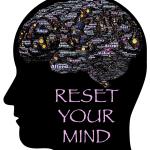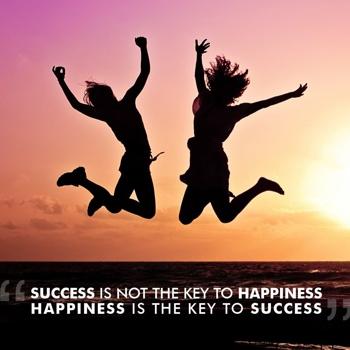Number 3 in the Happiness series.
The Socialist Revolutionary Karl Marx, author of The Communist Manifesto, said, “Religion is the opiate of the masses.” Critics such as Marx have charged that religion is an invention designed for people incapable of coping with life’s pressures. When we surrender our responsibility, Marx was correct.

Road to destiny or road to freedom?
We’re all under incredible pressure to accept change. We now have instantaneous global communications (often from a point of view). Our economic system leaves people out with no way to re-enter. Cultural and religious traditions are falling away. The Earth is undergoing significant changes that are threatening to us and controlling them is mind-boggling. Manufacturing industries have moved out so that they are only 8% of the economy. This isn’t Marxism, it’s the natural state of a world in which change is pervasive and always accelerating. We lean on anything concrete that will help us cope.
Too often we don’t learn coping skills. Colleges are seeing a lot of inability to cope in college freshmen. Their parents have solved all of their problems for them up to the moment they enter college, so they haven’t learned skills for accomplishment and coping. Teachers have let them slide by with easy assignments grades, so they are unable to cope when college courses are difficult. As a result, some college professors are compelled to make courses easier just to keep enrollments up and dropouts down.
Uneasiness leads to growth
“And do not be conformed to this world, but be transformed by the renewing of your mind, so that you may prove what the will of God is, that which is good and acceptable and perfect.” Romans 12:2 (NASB)
Does belief in God make you weaker or stronger?
It depends. Christianity and Judaism are essentially about taking personal responsibility, and this makes people stronger and the world a better place. But when you decide that God orchestrates everything and you have no personal responsibility, then it’s learned helplessness* and makes you weak and the world less good.
- Learned Helplessness: a condition in which a person suffers from a sense of powerlessness, arising from a traumatic event or persistent failure to succeed. It is thought to be one of the underlying causes of depression.
Free will is an issue that has divided the church before. To many God already has a plan for us and knows what is going to happen. All we have to do is follow along. To others, God is our close advisor and enabler but we work together.
We often misinterpret God’s plan. God plans to use people who are willing. We think foreknowledge means being puppets on a stage. God may know everything, but “the word foreknowledge is never used in terms of knowing about future events, times or actions (God’s omniscience). What it does describe is a predetermined relationship in the knowledge of God whereby God brings the salvation relationship into existence by decreeing it into existence ahead of time.” – How are predestination and election connected with foreknowledge?
Knowing God brings people into a predictable relationship with God’s way of doing things, and with applying this in your situation.
People are predictable
My wife usually knew which one of our kids were causing trouble and teachers usually know who the culprit is in class. They didn’t design the kids but they knew how they were “programmed.” Some kids are well behaved, some poorly behaved, and some are tattle tales. For adults this information might as well be written on the child’s forehead. One of our children was so certain my wife had eyes in the back of her head that he parted her hair to look for them. For God our behavior is predictable. God can predetermine how we can be used.
The same applies in business training and promotion, and in pastoring. I could see how different people would excel in certain areas, so I chose them. They always had free will to refuse. But they rarely did.
People are not puppets on a string
Some may limit their belief in “predestination” to whom ultimately gets saved. That’s the belief of John Calvin, who is the author of belief for Presbyterian, Evangelical Anglican, Independent Christian, Congregationalist, and Reformed Baptist denominational families. This includes Southern Baptists.
I don’t think Calvin is still driving the train. What I see on a daily basis is that people turn their entire lives over to God and declare that God is responsible for everything in their lives, including their choices, temptations, bad things that happen to them, their career growth, births of children, sickness and health, when they die, and their salvation. When something bad happens to them, or times get difficult, they feel it is God teaching them a lesson or punishing them.
Turning everything in life over to God is the ultimate surrender of any responsibility for themselves. It becomes learned helplessness. It isn’t the right direction. Having been a fundamentalist, American Baptist, SBC, Disciples of Christ, Presbyterian, and United Methodist, I can assure you this was not the teaching of John Calvin. According to Scripture, God is clearly not the author of bad things or temptations. The ways of living and behaving demonstrated for us point us in the right direction.
Depression and anxiety
Believing that you have no control over your future is a recipe for depression. Anxiety increased in the US from 2008 to 2018, and in teens and New Adults 18 to 25 depression nearly doubled.
In general, we probably should think in terms of “foreknowledge,” rather than “predestined.” We always have free will to decide our own future. It seems difficult for people to understand that God wants all to be in the Kingdom of God. Even if God knows some will refuse, it’s still our choice.
Giving someone else control of you, whether your mate, God, or society, leads to anxiety and depression. Locus of control was examined in 116 adult outpatients diagnosed as having chronic anxiety disorder, according to an NIH study: Locus of control in chronic anxiety disorders.
National Institutes of Health (NIH): The relationship between locus of control and depression.
Front line workers: Four-Step Approach for Overcoming Anxiety. NICABM
Our Responsibility
No individual or religious institution is directly responsible for any of us.
We are all works in progress. While we may have some feeling of superiority over others in their faith, such a feeling indicates we have a lot to learn.
New Adults commonly begin to reflect on their faith. Call it a period of evaluation and testing. Their faith becomes more mature. But many adults are locked into family and faith communities that are more fundamental in their beliefs. The standard is “God said,” rather than “Love others.” That influence may dominate, but as James Fowler says in his book, Faithful Change, “A transition from one stage of faith to another does not necessarily mean a change in the content or the direction of one’s faith. It does mean, however, changes in the ways one holds, understands, and takes responsibility for living one’s faith.”
In my experience there are beautiful people in every faith tradition that reflect the boundless love of God. Some of them may be trapped by their situations in religion and with their peers, but their approach to life is one of responsibility.
What we more often hear in the news is the shrill voices of those who are at the extremes, which makes us think we’re all different when we are all mostly the same. It is often that there are many in these faith traditions who can’t speak out simply because it betrays their community of believers, which would be intolerable to both.
Jesus drew on Judaism
The Jews have long taught that Judaism is about taking personal responsibility. Rabbi Lord Jonathan Sacks, former chief rabbi of the United Hebrew Congregations of the Commonwealth, points out in the article, Judaism is About Taking Personal Responsibility, that when Moses led the people from Egypt and they complained, God said, “Let them build something together.” This simple command transformed the Israelites.
Sacks continued, “Judaism is God’s call to responsibility. He does not want us to rely on miracles. He does not want us to be dependent on others. He wants us to become His partners, recognising that what we have, we have from Him, but what we make of what we have is up to us, our choices and our effort.”
“There is only one solution: to make the people co-architects of their own destiny, to get them to build something together, to shape them into a team and show them that they are not helpless, that they are responsible and capable of collaborative action … Hence the basic principle of Judaism, that we are called on to become co-creators with God.”
Jesus was a Jew. Most of his concepts had their roots in Judaism. He did and said nothing to refute individual responsibility. Our responsibility is to behave in our lives as Jesus showed us.
The Bible has these things to say about our responsibilities:
“Pure and undefiled religion in the sight of our God and Father is this: to visit orphans and widows in their distress, and to keep oneself unstained by the world.” James 1:27 (NASB). “For I was hungry, and you gave Me something to eat; I was thirsty, and you gave Me something to drink; I was a stranger, and you invited Me in; naked, and you clothed Me; I was sick, and you visited Me; I was in prison, and you came to Me.’” Matthew 25: 35,36.
“But if anyone does not provide for his own, and especially for those of his household, he has denied the faith and is worse than an unbeliever.” 1 Timothy 5:8
“For we must all appear before the judgment seat of Christ, so that each one may be recompensed for his deeds in the body, according to what he has done, whether good or bad.” 2 Corinthians 5:10
“For each will have to bear his own load.” Galatians 6:5 ESV
“Jesus replied, “A man was going down from Jerusalem to Jericho, and he fell among robbers, who stripped him and beat him and departed, leaving him half dead. Now by chance a priest was going down that road, and when he saw him he passed by on the other side. So likewise a Levite, when he came to the place and saw him, passed by on the other side. But a Samaritan, as he journeyed, came to where he was, and when he saw him, he had compassion. He went to him and bound up his wounds, pouring on oil and wine. Then he set him on his own animal and brought him to an inn and took care of him.” Luke 10:30-37 ESV
When we so all of the responsibilities Jesus showed us, then we can turn our attention to what others do.
Take Home Points
Thirty-eight percent of US pastors have considered resigning over the recent stresses on the church and infighting within the church. I recently said to a pastor based on my long experience in the church, in every committee there are two who completely disagree with the others, and are ready to slit the other’s throats because they somehow feel it’s the Christian thing to do. We laughed, but there are powerful feelings.
None of us can control anyone. Thinking that we can and thinking things are out of control, is a major cause of anxiety, depression, and hopelessness which drives radicalized activity that often ends in violence. We have to stop thinking that people who do things differently are our enemy – we have much more in common than we have differences. None of us have the authority to believe we are absolutely right. I was once Calvinist. I no longer am, but this had very little to no influence on my beliefs.
We shouldn’t stop helping each and every person because the love of God is what draws others to God, and this is what Jesus demonstrated for us, showing us how to live and love others. Whoever knows the right thing to do and fails to do it, for him it is sin.
“Why do you call me ‘Lord, Lord,’ and not do what I tell you? “Luke 6:46 ESV
Uh, I didn’t say I was good at it.
God didn’t give us the spirit of fear, but of power and love and self-control. We should love others fearlessly.
Learn how to cope with change: become adaptable. – Ted Foundation
Series Links
Don’t worry, be happy – Part 1
Clues to making and accepting change
Controlling your destiny – change and happiness
Gratefulness Changes Everything
We Need to Start a Happiness Epidemic
Satisfaction with the material things we have
Satisfaction with our place in life
Depending on employers and the economy for happiness
Economic exploitation Robs Us of Happiness
Focusing on the right things – The Fools Wise Prayer
___________________
Our answer is God. God’s answer is us. Together we make the world better.
- Dorian














